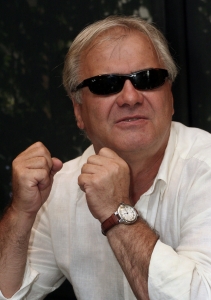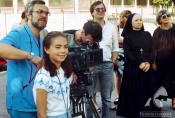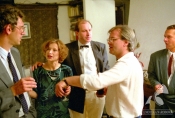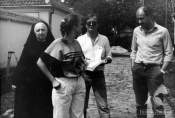Jacek Bromski

Film director, screenwriter, producer, and actor. He was born on December 19, 1946 in Wrocław. In the 1960s and 1970s, he worked as a DJ on Polish Radio; he also hosted concerts at song festivals in Opole and Sopot. Between 1965-1970, he studied painting at the Academy of Fine Arts in Warsaw, and then – in 1972-1974 – Polish literature at Warsaw University. A graduate of the Department of Directing of the State Higher School of Film, Television and Theatre in Łódź (1978). In 1988, together with Juliusz Machulski and Jacek Moczydłowski, he founded the "Zebra" Film Studio, where he served as literary director. Since 1996, he has continuously served as the president of the Association of Polish Filmmakers. In 2002, he was elected deputy head of the International Society of Cinematographers; since 2007, he has also served as the head of the World Cinema Alliance. From 2005-2008, he was the chairman of the Board of the Polish Film Institute.
He made his debut in 1980 with a Polish-Belgian-British musical Alice/Alicja jointly made with Jerzy Gruza and based on the book by Lewis Carroll. For his first independent feature film, made four years later – the TV psychological drama The funeral/Pogrzeb, he was awarded the Gdansk Festival Award for best debut. Two further films, the thriller Kill Me, Cop/Zabij mnie, glino (1987) and the comedy The Art of Love/Sztuka kochania (1989), were huge box-office hits. Bromski often returns to comedy, for example in Children And Fish/Dzieci i Ryby (1996), and the trilogy In Heaven As It Is On Earth/U Pana Boga Za Piecem (1998, award in Chicago and Gdynia), God’s Little Garden/U Pana Boga w ogródku (2007, award in Houston and Gdynia), God’s Little Village/U Pana Boga za miedzą (2009, award in Nanchang), and The Career of Nikoś Dyzma/Kariera Nikosia Dyzmy (2002), a modern adaptation of the novel by Tadeusz Dołęga-Mostowicz. He won many festival awards for his bitter comedy about teenage car thieves, It’s Me, The Thief/To ja, złodziej (2000, awards in Mar del Plata and California). He remained faithful to the crime story format in Entanglement/Uwikłanie (2011), inspired by the best-selling novel by Zygmunt Miłoszewski. Bromski’s oeuvre includes political films: Polish Cuisine/Kuchnia polska (1991), 1968. Happy New Year/1968. Szczęśliwego Nowego Roku (1992) and the TV series based on both these films, Polish Cuisine/Kuchnia polska (1993) – a panorama of the complicated fate of Polish families from the Stalinist era until the political transformation. His latest film, Ticket to the Moon/Bilet na księżyc (2013), is a poetic road movie about young people, set in communist Poland against the backdrop of the events of July 1969, when Neil Armstrong first set foot on the moon.
Bromski is also the co-producer of many well-known and highly regarded films, including Killer/Kiler (1997) and Kiler 2/Kiler 2-óch (1999) directed by Juliusz Machulski, Love Stories/Historie miłosne (1997, Golden Lions in Gdynia) and A Week in the Life of a Man/ Tydzień z życia mężczyzny (1999) by Jerzy Stuhr, The Debt/Dług (1999, Golden Lions in Gdynia) by Krzysztof Krauze, Day of the Wacko/Dzień Świra (2002, Golden Lions in Gdynia) by Marek Koterski, Vertigo/Lęk wysokości (2011) by Bartosz Konopka, and Women’s Day/Dzień kobiet (2012) by Maria Sadowska.
He was awarded the Medal for Merit to Culture – Gloria Artis (2005) and the Officer's Cross Order of Polonia Restituta (2011).
Jerzy Armata
Selected filmography
-
1991
POLISH CUISINE
-
1998
IN HEAVEN AS IT IS ON EARTH







